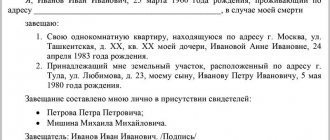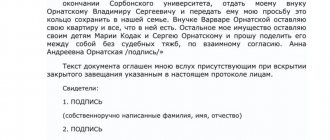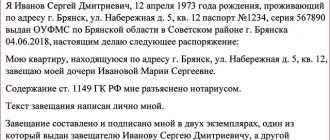3
A will is an excellent opportunity to transfer your property to your legal successors, bypassing legal inheritance. Only the owner has the right to decide how to dispose of his assets. At the same time, the owner determines the form of the will. There are open and closed wills - the latter option has many features and requires careful preparation from the participants. The risk of challenging a closed will is quite high - nevertheless, this form of expression of will is quite popular, primarily for the testator.
What is considered a closed directive in the event of death? How to properly draw up a closed will, what is the procedure for its publication? Are witnesses needed and who can act in this role? This article is devoted to the most relevant answers to questions.
What is a closed will?
A closed will is a written expression of the will of the owner, which is drawn up only by him and handed over to a notary in a sealed envelope in the presence of two witnesses (Article 1126 of the Civil Code of the Russian Federation).
A closed disposition means a regular will. The only difference is the procedure for its identification and subsequent registration. Here the testator indicates the list of alienated property, the range of applicants for the property, the shares of each participant, the conditions and requirements for applicants. If necessary, property is distributed evenly among the heirs - for example, the testator can assign a house/apartment to his son, a car to his grandson, and shares of a commercial enterprise to his wife.
Actions to check the will for legality are entrusted to a notary - no matter whether private or public. However, in the case of a closed will, the notary does not see the text of the testator, and therefore cannot check it for compliance with the requirements .
The testator bears all responsibility: he must draw up a competent will, take into account the provisions on the obligatory share in the inheritance, include only his assets in the property and put his personal signature. A closed will is a special secrecy of intentions. If other people find out about them, such an order cannot be considered closed.
How is it different from a regular order?
Having understood the definition of the concept of “closed will”, you should compare it with the usual order of the testator.
The differences are as follows:
- A closed will is drawn up by the testator in his own hand (clause 2 of Article 1126 of the Civil Code of the Russian Federation), and an open will can be written by a notary from the words of the owner.
- The procedure for filing a closed will requires a sealed envelope with the text of the declaration of will enclosed - a regular will is submitted on an A4 sheet.
- It is not allowed to draw up a closed order on a computer - the document is written strictly by hand in order to identify the handwriting of the deceased in case of inheritance disputes.
- A mandatory condition is the involvement of two witnesses , not from among the heirs or their representatives (clause 3 of Article 1126 of the Civil Code of the Russian Federation).
- Certification of a closed will - signatures of witnesses on the envelope with the will + signature of a notary on the second envelope. An open will only requires a notary's signature and seal.
- A closed will is kept by the notary in one single copy , while an ordinary will is kept in two - by the notary (original) and by the testator (copy).
- The announcement of a closed will has specifics: it begins no later than 15 days from the opening of the inheritance, the text of the will is read out by a notary, the presence of witnesses, heirs at law and probable claimants, and the keeping of minutes (clause 4 of Article 126 of the Civil Code of the Russian Federation).
Thus, a closed will differs from a regular will - primarily in the order of preparation, filing and announcement. When choosing the form of disposition, you need to pay attention to the features of wills.
Open view
To understand the types of such wills, you need to understand what the document itself is, how, where it is drawn up, and certified. A will is an official document certifying the order of inheritance of the owner's property after his death.
The owner has the right to change, reinterpret, and bequeath to other persons. Only the last will is considered legal; all previous wills are automatically canceled on the day the new document is drawn up. The testator independently chooses the type of document - closed, open will. The owner of the property has the right to draw up and sign it, being of sound mind, normal memory, and not being under anyone’s pressure. If there is a suspicion that this was not the case, the court may declare such a transaction invalid.
Important! The document is drawn up by one testator. Two or more persons cannot act as testators.
In Art. 149 (Civil Code of the Russian Federation) indicates persons who cannot be deprived of inheritance, regardless of whether there is a will or no such document. In the legislation they are referred to as obligatory heirs:
- minors, direct minor heirs under 18 years of age;
- Directly disabled (children, husband/wife);
- mother/father of the testator recognized as disabled;
- persons who are dependent on the testator.
Most often, a document is drawn up in the presence of a notary, who verifies the authenticity of the documents and the health status of the testator. Confirms the fact of the completed transaction with a signature or seal on the form of the accepted sample.
| Type of will | Regulatory articles of the Civil Code |
| Open (notarized) | GK. Ch. 61. Art. 1127 |
| Closed (certified in closed form by a notary) | GK Ch. 9. Art. 160 |
| Will in emergency circumstances (certified by authorized persons: chief physician, boat captain, consul, etc.) | GK Ch. 62. Art. 1129 |
| In favor of any person (freedom of a will, drawn up by a notary) | GK Ch. 62 Art. 1119 |
There are situations when it is impossible to notarize a will. For example, there is no notary office or it is located far from your place of residence. Such situations are provided for in Art. 127 (Civil Code of the Russian Federation), which gives the right to draw up wills to the following civil servants:
- heads of the medical institution where the owner of the property is undergoing treatment;
- chief physician in a nursing home;
- captain of a sea vessel, if the owner of the property is his employee;
- expedition manager;
- commander of the military personnel, if the owner of the property is a military personnel;
- manager in places where the owner is serving a sentence.
Once I had an interesting case. The woman was seriously ill, but was treated at home. Only the attending physician prescribed treatment, visited her at home, and the nurse carried out the appointments. One day my grandmother asked the doctor who came to help her make a will. The doctor refused, but after much persuasion and undeniable arguments, he “helped” the grandmother. The will was drawn up correctly, signed by the woman, the attending physician. The doctor's personal seal was used as a wet seal.
After her death, her will was declared invalid. This could not have happened if the transaction had been certified by the chief physician of the district hospital. But the district police officer does not have the right to do this if the patient is being treated at home. But you could just invite a notary to your home. It’s just that her doctor didn’t tell her this.
How to make a closed will?
Filing a closed will is a complex procedure. Whether the heirs will be able to challenge it in the future depends on how competently the order is drawn up. There are cases when closed wills are invalidated. In this case, inheritance occurs within the framework of the law - according to order and relationship. Therefore, you need to approach the process with full responsibility. If it is difficult for you to draw up a closed will or you are afraid that it may be challenged, contact the lawyers of our portal for help.
Procedure for compilation
A closed will is drawn up in the following order:
- Draw up a closed form order.
- Apply your personal signature and surname.
- Place the completed will in a white mailing envelope (no blots, marks, or shading).
- Find two witnesses - not from among the heirs or their representatives (for example, friends or work colleagues).
- Contact a notary's office and report your desire to transfer a closed will.
Witnesses present documents and put their signatures on the first envelope with the will. Please note that the text must be familiar only to the originator - neither witnesses nor the notary open the envelope. Then the notary places the envelope with the closed order in the safekeeping envelope. Next comes certification with the signature and seal of a notary, namely:
- information about the testator;
- date, place of adoption of the document;
- personal data of witnesses (full name, registration address and passport details).
When transmitting the order, the notary explains to the testator his duties in relation to compulsory heirs (Article 1149 of the Civil Code of the Russian Federation). A special note about this is made on the second envelope, even if the testator did not include such persons in the will. Let us remind you that the obligatory share is half of the share according to the law. It is provided to the disabled mother, wife, children and dependents of the testator.
The final stage of the procedure is the issuance of a certificate that confirms the notary’s acceptance of the closed order . The testator has the right to transfer this document to potential heirs or the executor - the administrator of the property (Clause 1 of Article 1134 of the Civil Code of the Russian Federation).
Check out the sample certificate:
Documentation
When drawing up a closed order, only the testator's passport . The duty of a notary is to establish the identity of a citizen and verify his legal capacity. Often, a notary requires a certificate from a psychoneurological dispensary - about the person’s sanity, the absence of mental illness, clouding of the mind, disorders, etc.
As for witnesses, they also need to have identification with them:
- passport;
- certificate of a military serviceman, long-distance sailor;
- temporary residence permit (TRP);
- residence permit (residence permit).
Otherwise, the notary will not accept the order from the testator.
The main package of documents will need to be provided after opening the envelope with the will. The order will determine the composition of the heirs, the list of property assigned to them, and the possible conditions of the testator. The details of the inheritance will be announced by the notary.
Closed will (sample)
Below is a sample closed order:
Timing of opening
The death of the testator starts the procedure for inheriting his property. If the deceased left a closed will, the deadline for opening the order is no later than 15 days from the date of death of the owner . This can happen either the next day or on the 14th day after the opening of the inheritance. The notary notifies all applicants and begins reading the closed will.
What is the price?
When drawing up a will, the testator will have to pay a state fee - its amount is 100 rubles (clause 13, clause 1, article 333.24 of the Tax Code of the Russian Federation). The rate is the same for all types of orders, regardless of their form and purpose. The costs are borne by the testator (owner).
The legal successors bear another type of expense - opening the envelope with the closed will and reading the text of the order. The cost is 300 rubles.
Notary services are subject to separate payment - the amount of remuneration is not taken into account when deducting the state duty. The cost of technical and legal services (TCL) must be clarified with a specific notary at the time of drawing up the order. Rates vary in different regions of the country. For example, for St. Petersburg, the cost of services can reach up to 2,900 rubles.
Acceptance of inheritance
Most of the problems associated with entering into an inheritance under a closed will occur in cases where the persons present at the announcement of the will are bypassed in the will.
Features of receiving an inheritance by law and by will, read more here.
When the true heirs are absent from the announcement procedure and nothing is known about their whereabouts, the notary finds himself in a rather difficult situation. Those who are passed over in a will are usually reluctant to provide any information about the named heirs.
The notary cannot publicly search for these people either. In this case, an application for inheritance from one of the people specified in the will is expected within 6 months.
If the heirs do not declare their rights to a share in the inheritance within the specified period, or renounce their rights to the inheritance in writing, then the property is transferred to the legal heirs or becomes the property of the state.
The search and notification of the specified heirs is not obligatory either for the notary or for other persons who were present when the will was read out. To enter into an inheritance, you must complete a number of mandatory documents. These include:
- a document containing information about the time and place of opening the act of inheritance;
- a document confirming the death of the testator;
- a document confirming relationship with the testator;
- certificate certifying the right to inherit.
Cancellation and modification of a closed will
The procedure for canceling or changing a closed will is the same as for an ordinary will. The declaration of will can be repeatedly edited and re-executed.
Rules for the disclosure of a closed will. Photo: myshared.ru
The reasons for revoking or changing a will are varied. But most often this is a change in the relationship between the testator and those persons in whose favor the will was drawn up. A complete revocation of a last will does not require the execution of a new copy of the will.
It can be done through a notary office. In this case, the testator is not obliged to indicate the reasons that prompted him to revoke the will. He is also not obliged to notify about this action the persons who are obligatory heirs according to the law and other relatives.
When annulled, the will loses its legal force. At the request of the testator, a completely new copy of the document can be drawn up and executed, in which all the necessary amendments will be made, up to a complete change in content.
When editing or drawing up a new will, it is very important, referring to the previous version of the will, to correctly indicate all the details, dates and other necessary information. Otherwise, the will will be declared invalid and its previous version will come into legal force.
Frequent problems and judicial practice
The law on closed wills has been in effect in the Russian Federation for quite some time. During this time, interest in this type of expression of the last will invariably only increases. The main reason for this interest is the complete secrecy of the contents of the document until the death of the testator.
The popularity of a closed will is also enhanced by the ability to circumvent legal norms. But it comes to the announcement of such a will relatively rarely. Often the notary deliberately tries to dissuade the client from drawing up a will of this type.
This is done so that the client’s legal illiteracy does not harm him. It is the professional duty of every notary and lawyer to ensure the most effective mediation between a person and the law.
The will must be drawn up in such a way that any cases of incorrect or more advantageous interpretation to the detriment of other heirs are excluded. The client usually cannot do this.
Many legal incidents and errors that make it difficult to enter into an inheritance could be easily prevented if the declaration of will was drawn up under the supervision of a specialist. As a rule, in such cases the will of the testator is not respected, and the property is subject to division in accordance with the law.
Thus, the secrecy of the contents of a closed will is both its advantage and disadvantage. Therefore, in order to avoid various mistakes, before drawing up a will, the notary allows the client to familiarize himself with a correctly drawn up sample of this type of document.
There are also frequent cases of a notary checking the written text. This goes against the rules of confidentiality, but it guarantees the exact execution of the will of the testator.
Is it worth it to draw up a will? You will find the answer in this video:
The procedure for announcing a closed order
An inheritance is opened upon the death of an individual who left a closed will. However, an inheritance case is not opened automatically - applicants for property must declare their rights by submitting an appropriate application to a notary. To do this, they are given a period for accepting the inheritance - 6 months (Article 1154 of the Civil Code of the Russian Federation). Only after the candidates apply, the notary will be able to read out the text of the deceased’s order.
Announcement procedure:
- Opening an inheritance case - at the request of one or more legal successors.
- Setting a date for the reading of a closed will (within 15 days).
- Invitation of the main candidates and two witnesses (uninterested).
- Checking documents, establishing the identities of those gathered.
- Opening the envelope with the will, reading the text out loud (see “Revelation of the will”).
- Drawing up the protocol - at the end of the process, participants familiarize themselves with its contents and put their personal signatures.
- Issuing copies of the protocol, sending the will to the archive.
- Starting the deadline for accepting inheritance for legal successors.
The form of the protocol on opening the envelope with the will is fixed by Order of the Ministry of Justice No. 313 of December 27, 2016.
Check out the sample:
Is it possible to rewrite a closed will?
The law does not limit testators - if they want to change or cancel an order that has already been written, no difficulties will arise. The most important thing is to take into account the procedure for changes and draw up a new will properly. The reasons for adjustments to the primary expression of will do not matter (clause 1 of Article 1130 of the Civil Code of the Russian Federation).
How to rewrite a closed will:
- The testator draws up a new text of the order.
- Puts a personal signature and a transcript of the surname.
- Determines the form of the will - ordinary or closed.
- He puts it in a blank envelope, attracts two witnesses and turns to the notary.
If the new order affects only part of the testator's property, the previous document is valid to the extent of the unaffected share. Separately, the testator can make an order to cancel a previously drawn up will for an apartment - just submit an application to a notary.
Can a closed will be declared invalid?
By drawing up a closed will, the testator takes on the risk of challenging it. Such cases cannot be excluded (for example, if the order does not comply with the form established by law).
Grounds for challenging the order:
- the text of the will is typed on a computer or typewriter and then printed on a printer;
- the testator did not sign the order;
- the testator made a disposition in relation to property that does not belong to him (for example, if he signed away his property and the share of his wife);
- there are no witness signatures on the envelope;
- the testator was incompetent at the time of signing the will - which is recorded in the medical certificate from the PND.
See our material on how to draw up a statement of claim to invalidate a will?
If the will is declared invalid or void, it has no legal force. But this does not mean that the heirs will not be able to receive the property of the deceased. It’s just that in this case, the testator’s assets will go to the heirs according to the law - according to family ties. Read more about the order of inheritance in our article “Order of inheritance by law: scheme”.
Determination of the compiler's legal capacity
This procedure concerns not only the testator himself, but also the witnesses he proposes. At the same time, the process of proving legal capacity is not unconditional. A notary has the right to request additional medical certificates if he has doubts about the mental or mental health of citizens. At the same time, there are also risk groups, such as the elderly.
With physical incapacity the question is much more complicated - it is not a basis for refusing certification. However, in this case, a complex procedure is also required with the introduction of a person who will write the text with his own hand. There are also people here who testify in favor of this text. Therefore, such an expression of will cannot be made unspoken.








